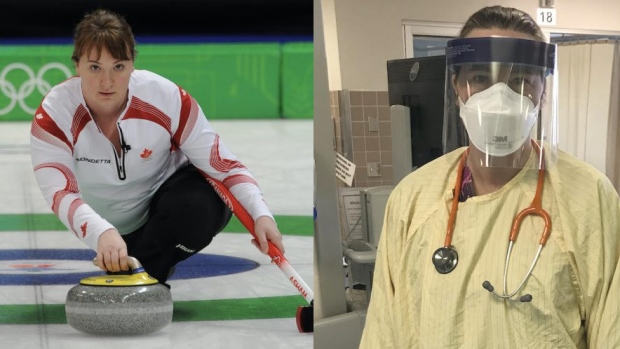Apr 1, 2020
Curler and respiratory therapist O'Connor describes working on front lines of pandemic
Susan O'Connor won Olympic silver as a third for Cheryl Bernard at the 2010 Winter Games in Vancouver. The pressure of playing on home soil at the Olympics must have been daunting, but it can't compare to what she is facing as a respiratory therapist during the COVID-19 pandemic.
TSN.ca Staff

Susan O'Connor won Olympic silver as a third for Cheryl Bernard at the 2010 Winter Games in Vancouver.
The pressure of playing on home soil at the Olympics must have been daunting, but it can't compare to what she is facing as a respiratory therapist during the COVID-19 pandemic.
The 42-year-old, who has worked as a respiratory therapist in Calgary for the past two decades, wrote a blog for Curling Canada describing what it is like to work on the front lines during a pandemic.
"My office is the head of the hospital bed. That’s the danger zone in these times. We will be coughed on," she wrote in the blog.
O'Connor says when people come to the hospital, she and other respiratory therapists "provide oxygen and other therapies" to help improve the patient's breathing. If the breathing doesn't get any better a ventilator could be the next option.
"If your breathing continues to deteriorate, we will assist in intubating you (put a breathing tube down your trachea); in some parts of the country, we are the ones who actually do it," O'Connor wrote. "We will manage your airway and the ventilator helping you breathe, suction the secretions from your lungs, and provide inhaled medications."
O'Connor, who is married with one child, says respiratory therapists are also the ones who remove the tube if the patient has lost their battle.
Under normal circumstances, family members would be there to say goodbye to a loved one. That won't be the case during this pandemic given the highly contagious nature of the coronavirus.
O'Connor says these are the type of things that keep her up at night.
"Usually when you take someone off the ventilator at end of life, they are surrounded by family and love. It’s very emotional to be involved in such an intimate moment," she said. "But I wonder what it will be like to do it to a patient who is all alone. Will I be able to sit with them while they pass or will I be called away? If it were my parent, sibling, or spouse I’d want someone to be there with them. What if it were yours?
"These are the sort of things that keep me up at night, along with concern that we won’t have enough equipment to treat the number of patients that are coming as this pandemic proceeds."
The six-time Scotties Tournament of Hearts competitor admits the number of health care workers affected by the virus in places like Europe and the United States is concerning.
"Will I bring it home to my family? How many weeks or months will it be before I feel comfortable cuddling my little boy?" O'Connor continued.
O'Connor knows the worst is still yet to come as well.
"These days I feel a bit like I’m preparing for a big championship. This is the calm before the storm. I want to head into this as mentally and physically healthy as possible. This means proper rest, nutrition and hydration," she said.
At the end of day, O'Connor, and many other health care workers around the globe, want everybody to stay safe by staying home.
"So I beg you, please take this seriously. Stay home when you can. Catch up on rest, start that project you’ve been putting off. Reach out to that friend you’ve been meaning to catch up with. Technology is a life-saver these days. Spend quality time with your family. Snuggle up with your kids. You probably don’t realize it, but being bored is a luxury," said O'Connor.
The men's and women's world curling championships as well as the rest of the season was cancelled last month due to the COVID-19 pandemic.
